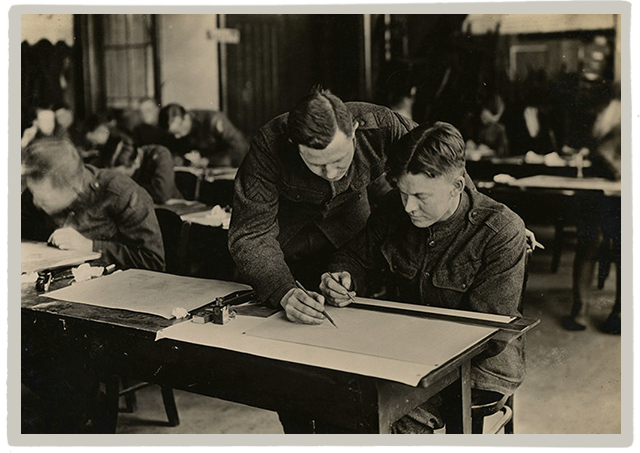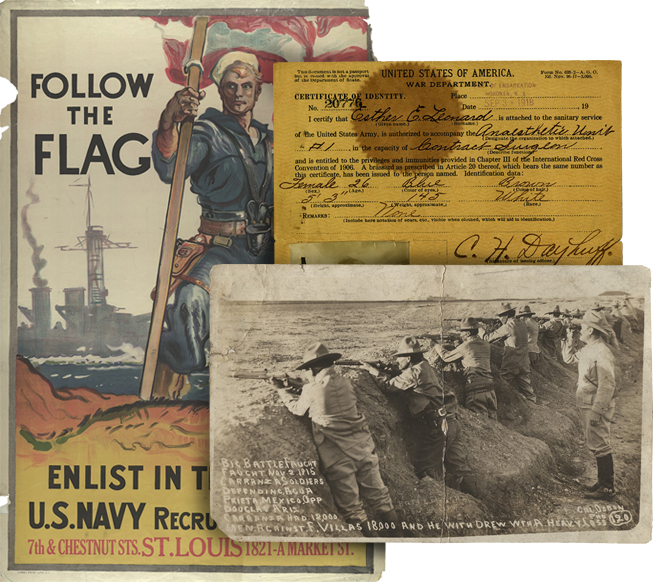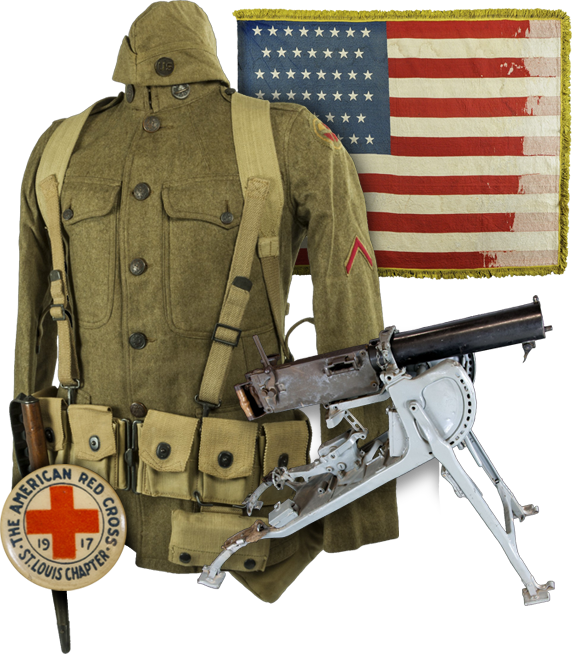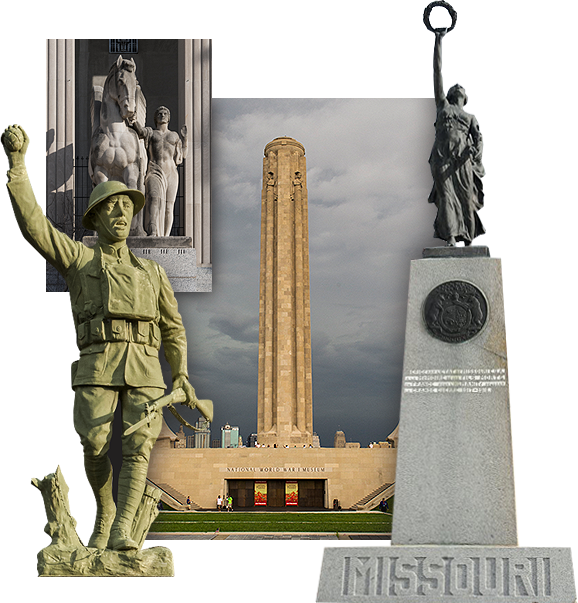James E. Henschel letter to Mrs. Leopold H. Henschel - June 15, 1919

Transcript
Coblenz-Neuendorf. June 15th, 1919 Dear Mother: The big move has come to pass; one of them. We are now at Coblenz-Neuendorf, Cadillac-less, the biggest part of the personelle of a bigger automobile reception park, moving, classifying, putting together, and doing a lot of work generally. Our location is beautiful, on the banks of the Rhine, where all day long the big boats pass by. The men can go swimming every day, if they wish, after four o'clock comes along, and a good many of them are taking advantage of the opportunity. Work starts at seven each morning (this week they took Sunday off the calendar, and so the boys are hard at it now, quit at noon, and then again from one to four. Quite a union proposition. It's good to have regular hours for work, for then the boys can figure just what time they will have to themselves. You should see them yanking these automobiles around. I have no idea how many thousand there may be here, but before we finish my gang of gentleman horsethieves will be able to tell me, to the last Quad or Riker. They certainly are going at it right, to make up for past errors, I guess. A good outfit of boys, except for the usual half dozen. It has been a short week, but so much has happened in it that one hardly knows where to begin. Our troubles commenced just before the last of our convoy of Cadlliacs pulled into the outskirts of Coblenz. I took the convoy (most like the old days!) while Charley rode ahead to make the necessary arrangements. He had a motorcycle fastened to the side of a limousine - the only practicable way to carry a salvage motor cycle that distance. Well, a certain Colonel, who happens to CMTO of the 3rd Army chanced to disagreed with this way of transporting motorcycles, and being the biggest bug in automobile circles in the A. of O., he relieved Charley then and there of command of the company. Can you beat it? That certainly is some sort of luck - the good Lord only knows just what kind - and I don't blame friend Watkins for feeling peeved. Anyway,

Transcript
that puts me in command of the company, but in a way that I can't exactly relish, for if I had been putting the cars ready for the convoy, I should have done just the same as Charley as regards the motorcycle. Now they want to try him by a general, for something or other that can be framed up on the grounds of mistreating a motorcycle or a limousine or a colonel's feelings. I was pretty sore on the world for a few hours. Of course it is not policy to criticize one's superior officers, and I have no intention of doing so, but the heads of services have ways of doing and thinking that are a little beyond your second looey son. Sometimes it all doesn’t work out exactly fairly, it seems to me, but then, I don't know all the kinks and ins and outs. I feel might sorry, for Charley, because it is impossible for you or for his people to understand just how it was that he was removed. It really was no fault of his, but just a mistake on somebodies part. The C.M.T.O. told him that he was inefficient, yet just a few days ago, he received a letter from the head of G-4, General Staff, to effect that he was "a very efficient and capable officer, and I take pleasure in recommending him to the next highest grade in his service". Also, the inspector General of the Motor Transport Corp himself paid us a visit at Trier a little while ago, and told us that our transportation was the best he had seen in the A.E.F., the best looking and the best cared for - and Dad probably knows how much it takes to get a statement like that out of an Inspector General. And our cars at Trier had the hardest and longest trips of any cars in the entire army, all the way from Berlin to Bordeaux, and never any warning. Charley has maintained a record for the company that any one could be proud of, in spite of the C.M.T.O., 3rd Army. It's a funny game at best, and I don't want to be in it any longer than necessary. (Yet, out of a still existant sense of decency and fairness to the boys, I signed a statement yesterday that there were no officers in the company who wished to return at once ahead of their organization!) Outside of this fly in the ointment, I am quite happy and

Transcript
and contented. The hours of work are regular, the boys are turning out fine work, and have the best possible sort of spirit, the officers with whom I associate are all gentlemen and honest - good people to live and work with, the surroundings are excessively beautiful, my billet is fairly comfortable, and the days are always sunshiny. Ergo: a nice way to go to war. We work our ten hours a day, and the boys all keep a grin on their faces; that's all I want. There are very few "gold bricks" in the outfit. I make it a point to be with them myself as much as I can, so I know. I have taken over all the motorcycles in this park, and there are one or two of them. If you can imagine something like a thousand motor cycles just kicked off the ends of trucks all in a pile, you can get the picture. my job is to classify them all according to condition and make, and make a park, all neatly lined up, out of a rubbish pile. I have taken a sergeant and eight of my boys, and we made quite a hole in the pile yesterday and this morning. The rest of the company, I have assigned to work around the automobiles and trucks. The classifying is the hardest job of all, that is to do it right. The classes run from "A" to "F". "A" is a new machine (very few of them) "B", a machine that has been used, but is in practically perfect condition; "C", those that require minor adjustments; "D" those that require minor repairs; "E" those that need minor repairs or thorough overhauling; and "F", the poor old duds, whose last days of usefulness are past. Once classified and parked properly, then comes the work of repairing them as near as possible to class "B". All of this promises to take quite a little while, for as yet, I can not use more than a small number of my men on this work. It's interesting, as has been all of my work over here, and so I am glad to have the job. Once peace is signed, things may move along more rapidly, but until it is signed, we have our hands full. All of this material will be eventually sold, so you can see that our work is a bit of the very little that is bringing back into the pockets of Uncle Samuel a little of the coin of the realm. If we get to finish our work, I estimate roughly that the machines in the park will

Transcript
be worth from 300 to 350 per cent more than they could bring on the open market today. As it is, they will go cheaply enough to whom so ever is lucky enough and has foresight enough to attend the sale sensibly. Voila, ma chere mama, il faut que on manger, and I have an appetite like a horse. My thoughts are always home these days, with my own people. Ned - My address for the next coming few years: Motor Reception Park #3, APO 927, Am. E. F., Coblenz-Neuendorf, Germany. The "Coblenz-Neuendorf" part is not exactly necessary, but perhaps it might hasten up forwarding. We are told that next Sunday will tell whether or no our sentence is for life, or merely the next generation. On next Sunday, if things are not satisfactory, the advance further into Germany is slated to begin -- I don't think. Charley starts on his way towards Brest, the first step on a long journey, in a day or so. Perhaps he is really pretty lucky after all.
Details
| Title | James E. Henschel letter to Mrs. Leopold H. Henschel - June 15, 1919 |
| Creator | Henschel, James E. |
| Source | Henschel, James E. Letter to Mrs. Leopold H. Henschel. 15 June 1919. James Edward Henschel Collection, 1917-1919. 1996.51. The National World War I Museum, Kansas City, Missouri. |
| Description | In this letter dated June 15, 1919, Henschel wrote his mother from Coblenz, Germany where he described his work of moving, classifying, and putting together automobiles. |
| Subject LCSH | American Field Service; Missouri. National Guard; United States. Army. Motor Transport Corps; Automobiles |
| Subject Local | WWI; World War I |
| Site Accession Number | 1996.51 |
| Contributing Institution | National World War I Museum and Memorial |
| Copy Request | Transmission or reproduction of items on these pages beyond that allowed by fair use requires the written permission of the National World War I Museum and Memorial: (816) 888-8100. |
| Rights | The text and images contained in this collection are intended for research and educational use only. Duplication of any of these images for commercial use without express written consent is expressly prohibited. |
| Date Original | June 15, 1919 |
| Language | English |



